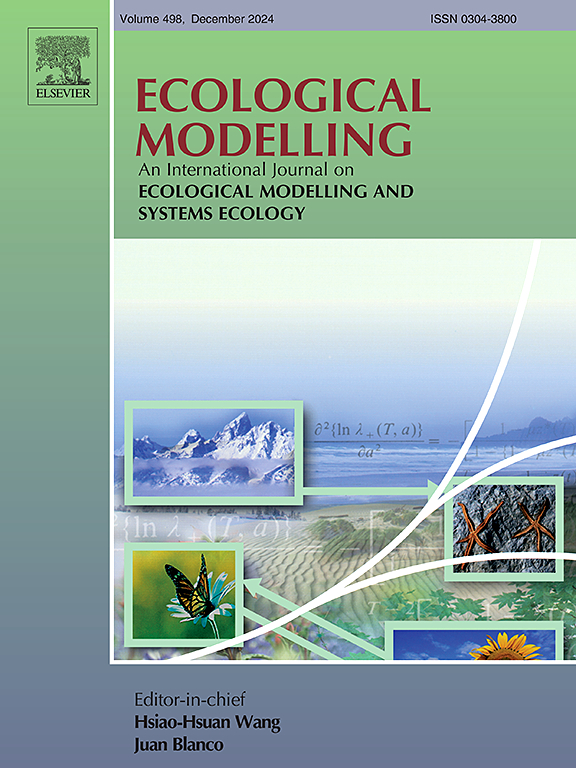利用动态能量预算探索生活史性状的生理约束
IF 2.6
3区 环境科学与生态学
Q2 ECOLOGY
引用次数: 0
摘要
预测物种对全球变化的反应目前面临的一个挑战是了解对快速变化的环境和新环境条件的进化反应。据推测,进化的速度将高度依赖于由资源分配权衡和其他生理机制形成的进化约束,这些机制是性状表达的基础。然而,大多数用于研究生命史进化的模型在本质上仍然是现象学的。它们没有纳入符合既定物理和化学规律的资源转移和转化的现实机制。因此,我们的目标是探索生物体在现实代谢过程中真正可用的全部生活史策略,并将其与经典生活史理论的预测进行比较。为此,我们采用动态能量预算(DEB)理论对个体的能量分配进行建模。在恒定的环境条件下(最佳温度和任意食物来源),我们通过改变模型的能量主要参数(即生理过程)的值来研究个体间的差异。研究发现,影响生长和繁殖的生理过程,如能量的获取、分配和调动,在一定程度上再现了生活史理论的预测。然而,一些差异仍然存在,主要是因为DEB理论解释了生命历史理论中没有阐明的生理回溯。例如,更快的生长分别通过增加资源获取和稀释致害化合物对生殖和衰老产生间接影响。基于这些见解,我们提出了将生理学,特别是代谢,整合到生命史进化模型中的未来方向。本文章由计算机程序翻译,如有差异,请以英文原文为准。
Exploring physiological constraints on life-history traits using Dynamic Energy Budgets
A current challenge in predicting species responses to global change is to understand evolutionary responses to rapidly changing environments and novel environmental conditions. It has been hypothesised that the speed of evolution would be contingent uponhighly dependent on evolutionary constraints shaped by resource allocation trade-offs and other physiological mechanisms underlying the expression of traits. However, the majority of models employed to investigate life-history evolution remain phenomenological in nature. They fail to incorporate realistic mechanisms for the transfer and transformation of resources that are in accordance with the established laws of physics and chemistry. Our objective was therefore to explore the full range of life-history strategies that are genuinely available to organisms through realistic metabolic processes and to compare them with the predictions made by classical life-history theories. To this end, we employed the Dynamic Energy Budget (DEB) theory to model the energy allocation of individuals. We studied inter-individual variation by varying the value of energetic primary parameters (i.e. physiological processes) of the model, under constant environmental conditions (optimal temperature and ad libitum food source). Physiological processes that impact both growth and reproduction, such as energy acquisition, allocation and mobilisation, were found to reproduce the predictions of life-history theory to a certain extent. However, some discrepancies remained, mainly because DEB theory accounts for physiological retro-actions that are not articulated in life-history theories. For example, quicker growth had an indirect impact on reproduction and ageing through respectively increased resource acquisition and dilution of damage-inducing compounds. Based on those insights, we propose future directions to integrate physiology, and in particular metabolism, into models of life-history evolution.
求助全文
通过发布文献求助,成功后即可免费获取论文全文。
去求助
来源期刊

Ecological Modelling
环境科学-生态学
CiteScore
5.60
自引率
6.50%
发文量
259
审稿时长
69 days
期刊介绍:
The journal is concerned with the use of mathematical models and systems analysis for the description of ecological processes and for the sustainable management of resources. Human activity and well-being are dependent on and integrated with the functioning of ecosystems and the services they provide. We aim to understand these basic ecosystem functions using mathematical and conceptual modelling, systems analysis, thermodynamics, computer simulations, and ecological theory. This leads to a preference for process-based models embedded in theory with explicit causative agents as opposed to strictly statistical or correlative descriptions. These modelling methods can be applied to a wide spectrum of issues ranging from basic ecology to human ecology to socio-ecological systems. The journal welcomes research articles, short communications, review articles, letters to the editor, book reviews, and other communications. The journal also supports the activities of the [International Society of Ecological Modelling (ISEM)](http://www.isemna.org/).
 求助内容:
求助内容: 应助结果提醒方式:
应助结果提醒方式:


